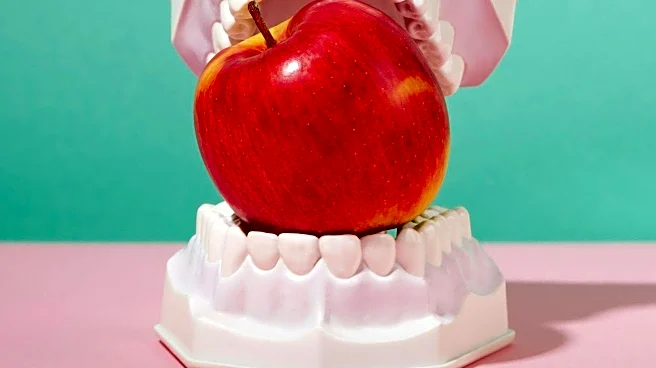What's Happening?
Dr. Michelle Jorgensen, a dentist and holistic health practitioner, shared a viral TikTok video of a breast cancer patient's oral X-ray, revealing two infected root canals. The patient, Melissa Jacobsen,
was diagnosed with invasive ductal carcinoma and later found to have abscessed teeth with large pockets of infection. These teeth were extracted, and the oral surgeon noted the extensive infection. Jacobsen reported improved health following the removal, emphasizing the connection between oral health and overall well-being. Dr. Jorgensen highlighted that oral infections can compromise the immune system, making it harder for the body to fight diseases like cancer.
Why It's Important?
The discovery underscores the critical link between oral health and systemic health, particularly for cancer patients. Oral infections can quietly leak bacteria and toxins into the bloodstream, potentially compromising the immune system. This revelation is significant for healthcare providers and patients, as it suggests that regular dental evaluations could be crucial for those undergoing cancer treatment. It also highlights the importance of maintaining good oral hygiene to support immune health, which could lead to better outcomes for cancer patients and reduce the risk of infections.
What's Next?
The case may prompt further research into the relationship between oral health and cancer treatment outcomes. Healthcare professionals might consider integrating dental evaluations into routine cancer care to identify and address potential oral infections early. This could lead to new protocols in cancer treatment, emphasizing the importance of oral health in managing overall patient health. Additionally, public health campaigns might focus on educating the public about the importance of oral hygiene in preventing systemic health issues.
Beyond the Headlines
The incident raises ethical considerations regarding the standard of care for cancer patients, particularly the need for comprehensive health evaluations that include dental assessments. It also highlights cultural dimensions, as awareness of oral health's impact on systemic health varies across different communities. Long-term, this could shift healthcare practices towards a more holistic approach, integrating dental care into general health maintenance, especially for vulnerable populations like cancer patients.










